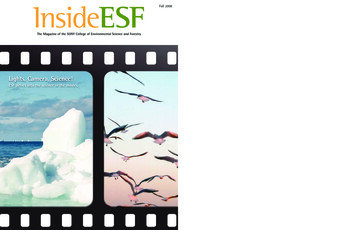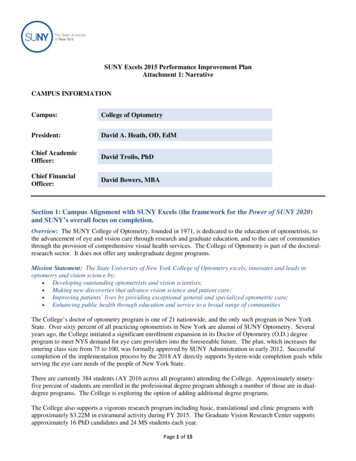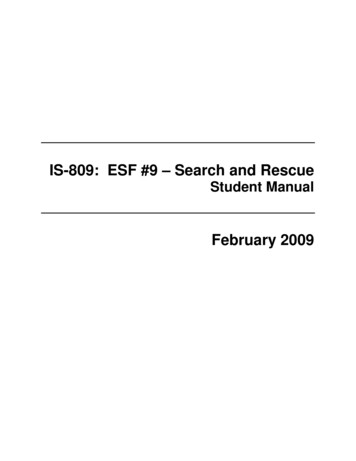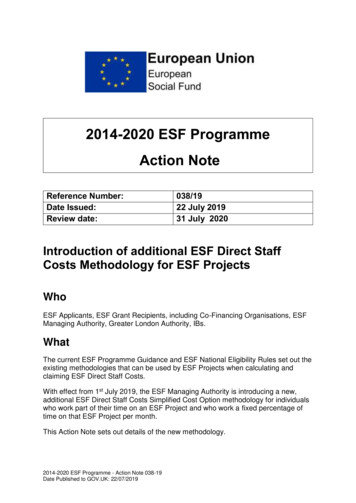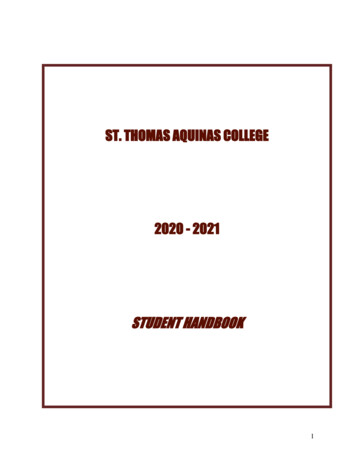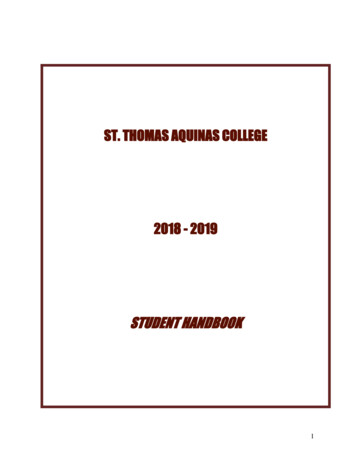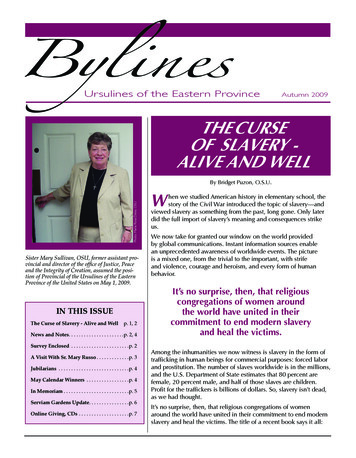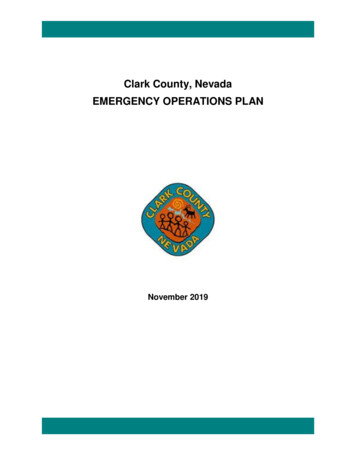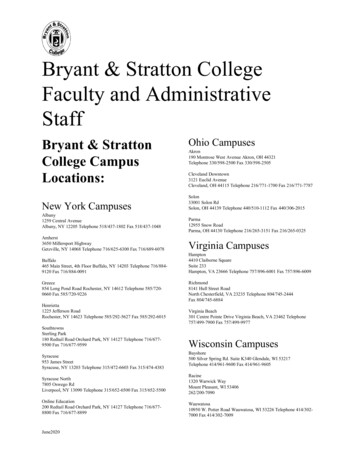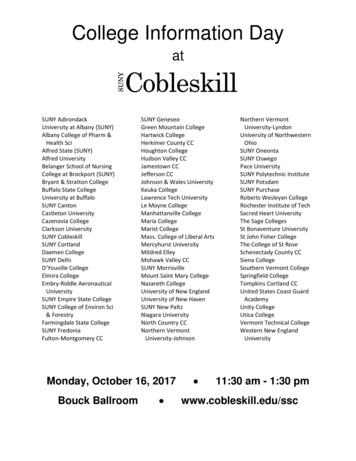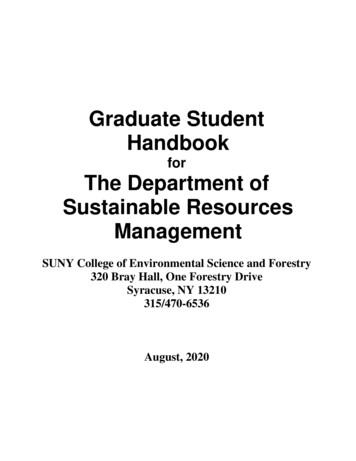
Transcription
Graduate StudentHandbookforThe Department ofSustainable ResourcesManagementSUNY College of Environmental Science and Forestry320 Bray Hall, One Forestry DriveSyracuse, NY 13210315/470-6536August, 2020
SRM 2020-21 Graduate HandbookTable of ContentsI. INTRODUCTION . 1SRM Mission Statement . 1Graduate Education Committee and Coordinator . 1Email Account . 1II. PROCEDURES AND POLICIES . 2ADMISSIONS INFORMATION FOR PROSPECTIVE GRADUATE STUDENTS . 2College Requirements . 2Graduate Student Assistantships . 3Areas of Study and Guidelines for Coursework and Research . 3INFORMATION FOR MATRICULATED GRADUATE STUDENTS . 6Graduate Petition Process . 6Rules for Changing Degree Programs . 6Cumulative GPA Requirements . 6Graduate Student Fellowships, Awards, and Scholarships . 6Graduate Credit for Graduate Assistantship Courses . 7III. THE MASTER OF FORESTRY DEGREE . 9Prerequisites . 9Transfer Credit . 9Steering Committee . 10Coursework Requirements and Guidelines . 10Graduate Degree Requirements . 12Student Program of Study . 13Department of Sustainable Resources Management MF Checklist . 14IV. THE MASTER OF PROFESSIONAL STUDIES DEGREE . 15Prerequisites . 15Transfer Credit . 16Steering Committee . 16Coursework and Capstone Requirements . 16Seminars . 17Program specific requirements: . 17Student Study Plan . 19Department of Sustainable Resources Management MPS Checklist . 21V. THE MASTER OF SCIENCE DEGREE . 22Prerequisites . 22Transfer Credit . 23Steering Committee . 23Coursework Requirements and Guidelines . 23Seminars . 24Capstone. 24600-level and Resident Courses . 24Student Program of Study . 25Thesis Proposal . 25Thesis . 25Thesis Defense Examination. 25Department of Sustainable Resources Management MS Checklist . 27i
SRM 2020-21 Graduate HandbookVI. THE DOCTOR OF PHILOSOPHY DEGREE . 28Prerequisites . 28Transfer Credit . 29Steering Committee . 29Coursework Requirements and Guidelines . 29Seminars. 30Capstone. 30600-level and Resident Courses . 30Student Program of Study . 30Preliminary Examination . 31Dissertation Proposal . 31Doctoral Candidacy Examination . 31Dissertation . 33Dissertation Defense Examination . 33The Department of Sustainable Resources Management PhD Checklist . 35VII. EXPECTATIONS AND RESPONSIBILITIES FOR . 36SRM MAJOR PROFESSORS AND GRADUATE STUDENTS . 36Commitments and Responsibilities of the Graduate Student . 36Commitments and Responsibilities of the Major Professor . 37VIII. CLASSROOM ETIQUETTE EXPECTATIONS . 39IX. CONCURRENT DEGREES WITH SYRACUSE UNIVERSITY . 40General Information . 40Master of Public Administration in the Maxwell School of Citizenship and Public Affairs . 40Master of Business Administration in the Martin J. Whitman School of Management . 41Master of Arts or Master of Science in the S.I. Newhouse School of Public Communications41Master of Science in the School of Education . 41X. RESOURCES. 42SRM Offices: 320 Bray Hall. 42Mailboxes. 42Office Space . 42Keys . 42Email Communication . 42Computers and the Internet . 42Equipment . 43Conference Rooms: 314 and 324 Bray Hall . 43College Properties . 43Appendix A: Petitions . 44Background . 44Completing Petition Forms . 44Appendix B: MPS Course Lists . 45MPS Course List for FRM degree1 . 45MPS Course List for NRM degree1 . 46MPS Course List for CM degree1 . 47MPS Course List for SC degree1 . 48Appendix C. Examples of specialization electives for the MPS in Natural ResourcesManagement* . 49ii
SRM 2020-21 Graduate HandbookAppendix D. Examples of specialization electives for the MPS in Sustainable Energy* . 50Appendix E. Directed and open electives for the MPS in Construction Management. . 51Appendix F. Core and elective courses for the MPS in Sustainable Construction. . 52Appendix G. Description of Manuscript Option for Writing MS Thesis and PhD Dissertation. . 53The Manuscripts. 53The Thesis or Dissertation Introduction and Summary Sections. 54Appendix H: Professional Experience/Internship Guidelines . 55Sustainable Resources Management Internship Agreement . 56Internship Evaluation . 58Appendix I: Department Directory* . 59iii
SRM 2020-21 Graduate HandbookI. INTRODUCTIONWelcome to the 2020-21 Academic Year! We are delighted to have you join a unique set ofgraduate students, faculty, and researchers who share a deep concern for the development andapplication of interdisciplinary approaches to the stewardship of natural resources. This is theGraduate Student Handbook for The Department of Sustainable Resources Management(SRM). This version supersedes all previous Handbooks.This handbook describes policies and procedures specific to SRM graduate programs. Policiesthat pertain to you are set at several levels. The New York State Education Department andthe State University of New York (SUNY) establish basic policies for all graduate programs.The ESF Graduate School has adopted a comprehensive set of graduate policies. These arepublished in the College catalog (http://www.esf.edu/catalog/graduate.htm). In addition, SRMhas developed specific policies, procedures, and guidelines for the effective delivery of ourgraduate programs. This handbook will guide you through the complexities of SRM’sgraduate programs.SRM Mission StatementThe mission of the Department of SRM programs is to produce and to transmit knowledgeabout the function and dynamics of forests and related renewable resources to all of ourcustomers; to encourage continual learning about forest and related renewable resources andtheir role in making people's lives better; and to develop leaders who will manage renewableresources for people on a sustainable basis.Graduate Education Committee and CoordinatorDr. Diane M. Kuehn is the Coordinator of the SRM Graduate Education Committee, whichadministers all SRM graduate degrees. Feel free to ask her questions that arise from your useof this handbook and throughout your graduate education. She can be reached atdmkuehn@esf.edu or 315-470-6561.Email AccountAll SUNY-ESF students have an email account assigned to them by the Registrar. This isyour official email address. Dr. Kuehn will only use your official SUNY-ESF email address tosend you information concerning job announcements, assistantships, etc. As this is yourofficial email account, it is your responsibility to check it at least once a week. Students thatfail to do so will not receive important messages sent by the Department or the College.We are always looking for ways to improve this handbook and our advising services. Please letus know what we can do to make your graduate program more effective for you.Dr. Diane M. Kuehn, Chair – Graduate Education CommitteeDr. Christopher Nowak, Chair – Department of Sustainable Resources Management1
SRM 2020-21 Graduate HandbookII. PROCEDURES AND POLICIESADMISSIONS INFORMATION FOR PROSPECTIVE GRADUATE STUDENTSCollege RequirementsFor applicants whose native language is not English, ESF requires either official TOEFLor IELTS scores. Total TOEFL scores must be a minimum of 80 with a score of at least 17on each individual section on the internet-based exam. If the old paper-based TOEFL isused, the minimum score is 550; if the old computer-based TOEFL is used, the minimumscore is 213. For the IELTS exam, a minimum score of 6.5 is required with no less than a 5 inWriting. If these minimum scores are not met, the college cannot authorize visa paperwork.If an accepted applicant’s score is less than 100 on the internet-based exam, 600 on thepaper-based exam, or 250 on the computer-based exam, the student will be required totake the English Language Assessment Exam (ELAE) administered by SyracuseUniversity. Based on results of that exam, students may be directed to enroll inpreparatory courses in English language usage. Students with higher scores can alsobenefit from these courses.ADVISORY NOTE: GRE scores are normally required for entry into SRM but have beentemporarily waived due to the Corona Virus crisis.SRM Requirements:1. Each admitted graduate student must have a major professor willing to providementoring through the graduate program. It is highly recommended that applicants contactand identify at least one possible major professor prior to submitting an application.2. Recent GRE test scores (or other type of graduate record exam scores, such as theLSATs or GMATs) are required as part of a complete application. For MPS, MF, MS, andPhD applicants, the GRE requirement for the application process can be waived uponrequest by the applicant’s future Major Professor to the Graduate Education Coordinatoronly if the Major Professor has had extensive prior experience with the applicant (e.g., asan undergraduate instructor or advisor for the applicant). For MPS and MF students, theGRE requirement can also be waived upon request by the applicant’s future MajorProfessor to the Graduate Education Coordinator based on a high undergraduate GPA(e.g., 3.5 GPA or above) or other example of high academic potential (e.g., refereedjournal articles, other advanced degrees).3. The Department of SRM will accept test scores only for GRE exams taken within thepast five (5) years. Older GRE scores will only be accepted if:a. The applicant has successfully completed a graduate degree.b. The applicant has successfully completed graduate-level coursework within the pastfive years.SRM GPA and GRE Score Guidelines:1. An academic record showing a minimum GPA of at least a B (3.0 on a scale of 4.0)average for the junior and senior year of a baccalaureate program.2
SRM 2020-21 Graduate Handbook2. A combined GRE score of approximately 300 (verbal plus quantitative) for master’slevel applicants and a combined GRE score of approximately 315 (verbal plusquantitative) for doctoral level applicants.While GRE scores and GPA are important to our evaluation of graduate applications,other factors are also fundamental to the admission decision: strong letters of referenceindicating the applicant’s ability to succeed in graduate school, prior experience in thefield, a well written statement of education goals, and other experiences or qualificationsthat may indicate potential for graduate study.Admission to SRM’s PhD programPhD applicants have the same admissions requirements as MS, MF, and MPS students(see above). Though a master’s degree is not required to enter SRM’s PhD program,significant research experience and/or a MS degree is strongly recommended.Graduate Student AssistantshipsSRM offers two (2) types of assistantships: Graduate Assistantships (GA) and ResearchAssistantships (RA). Each year, SRM awards Graduate Assistantships based on facultyrecommendations. They are used primarily to assist professors teaching undergraduatecourses. Each spring, students who will be returning in the fall are asked by the GraduateEducation Coordinator to apply online for a Graduate Assistantship; incoming studentscan also be included in the selection pool. The online application is available at:https://www.surveymonkey.com/r/SRM GA application. Each student must apply eachyear that support is desired. Graduate Assistantship assignments are decided in the springsemester for the next academic year; students may also apply in the fall for considerationfor openings in the spring. Priority is given to PhD and MS students, followed by MF andMPS students. To be considered for a GA, students must have a Major Professor in SRM.As a research university, SUNY-ESF is involved in numerous externally funded projects,many of which support graduate students through Research Assistantships. Each project ismanaged by a Principal Investigator, who is responsible for selecting staff, includingResearch Assistants. Students interested in Research Assistantships should discussopportunities with their major professors.Areas of Study and Guidelines for Coursework and ResearchSelection of an appropriate area of study involves thinking well beyond the Department ofSustainable Resources Management (SRM) and ESF’s graduation requirements. Graduatestudy in science should include: 1) a body of knowledge, 2) a set of methodologies fortesting the theoretical framework of that knowledge, and 3) an applied understanding ofhow the results are important to an identified user clientele or scientific peer group.3
SRM 2020-21 Graduate HandbookIn SRM, we have four degree programs, some of which contain broad areas of study:1. Degree Program: Forest Resources Management (FRM)Areas of study: Ecology and Ecosystems (EE) Economics, Governance, and Human Dimensions (EGHD) Monitoring, Analysis and Modeling (MAM) Forest Management and Silviculture (FMS)2. Degree Program: Natural Resources Management (NRM)3. Degree Program: Sustainable Energy (SE)4. Degree Program: Sustainable Construction Management (SCM)Areas of study: Construction Management (CM) Sustainable Construction (SC)Each program and area of study includes multiple topical and theoretical subsets for study,and can be adapted to your specific application, research, and scholarship interests.For MS and PhD students, research methodology includes specific techniques forgathering data, such as using mass spectrometers, growth chambers, social surveyinstruments and techniques, sampling or experimental designs, or parameter estimatesusing regression or logit models. Methodology also includes development of a broadunderstanding of science, its philosophical dimensions, and the common sense of purposeand values across all forms of science.In order to solve important problems through research, students need to work with peoplewho have already mastered the scientific process. This is the reason that both the MS andPhD program rely heavily on apprenticeship ties to major professors, committees, anddepartments. It is also one reason that SRM and ESF require seminar experience.SRM and ESF have a strong tradition of minimizing general requirements for graduatestudies. Instead, SRM relies on the wisdom of major professors, committee members, andindividual students to guide program development and selection of courses. The followingguidelines, however, provide a framework for developing strong programs.Your program of study should include two to four courses in each of three categories:theory, research methods, and important problems in forest resources management.Theory: Broad theory appropriate to the area of study, and Applied theory for more specific focus4
SRM 2020-21 Graduate HandbookResearch methods: General research methods and philosophy of science, Statistics, and Other research methodsImportant problems in Sustainable Resources Management: Additional seminar courses, and Integrative courses with professional studentsStudents who do not have an undergraduate degree in forest or natural resourcesmanagement or a closely related subject may, at the discretion of their steering committee,be required to take additional courses to fulfill prerequisites for courses. The specificcourses will be selected by taking into consideration academic and career objectives inconsultation with the student's major professor and steering committee.5
SRM 2020-21 Graduate HandbookINFORMATION FOR MATRICULATED GRADUATE STUDENTSGraduate Petition ProcessA few graduate students manage to complete their entire degree programs without havingto file a single petition. However, because of our students’ diverse backgrounds, interests,degree programs, and personal lives, some students occasionally find themselves in needof an alternative means of meeting a College or SRM requirement. The correct vehicle touse is a Petition (see Appendix A for more information on petitions). Petition forms maybe obtained from the Registrar's Office (111 Bray Hall).Rules for Changing Degree ProgramsStudents can switch degree programs (i.e., MF, MPS, MS, or PhD) at any time withapproval of their committee (as shown via a revised 3B form) and by petition to the SRMGraduate Education Committee.Cumulative GPA RequirementsAll graduate students in SRM are required to maintain a cumulative grade point average ofat least 3.00 in their graduate level courses, as per ESF college-wide requirements.Students who do not maintain this average, or who receive two or more grades ofUnsatisfactory (U) for their thesis research or capstone project work, are placed onprobation or can be suspended from ESF by the Associate Provost for Instruction andDean of the Graduate School upon the recommendation of the College Subcommittee onAcademic Standards (see “http://www.esf.edu/graduate/ms.htm” for more information).Graduate Student Fellowships, Awards, and ScholarshipsFellowships. Fellowships are awarded to students based on various competitive scenarios,usually involving an evaluation of a student’s background, accomplishments, and promisefor future professional and personal development.The Farnsworth Fellowships are presented to both an MS and PhD student whodemonstrate and hold promise for scholarship and service in Sustainable ResourcesManagement. The SRM Awards Committee selects the Farnsworth recipients. Studentsself-nominate for the Farnsworth award with letters of recommendation from selectedprofessors. Historically, the Farnsworth Fellowships are awarded in the spring.Announcements for applications are distributed to students and faculty each year.Awards and Scholarships. The Leaf Award is presented to a graduate student who has arecord of and shows promise for research in Sustainable Resources Management. TheSRM Awards Committee selects Leaf recipients. Faculty (usually the major professor)nominate students for the Leaf Award. The Leaf Award is presented in the spring.Announcements for applications are distributed to faculty each year.6
SRM 2020-21 Graduate HandbookThe Wolf Forest Policy Scholarship is awarded to support a student pursuing studiesrelated to the development of U.S. forest policy on the national level; or to support U.S.forest policy development activities of SRM. An SRM faculty member will nominatestudents for this scholarship.The Marshall Award is presented to a graduate student who demonstrates aptitude andachievement in scholarship or research on wilderness and protected area policy andmanagement. The SRM Awards Committee selects the recipients of the Marshall Award.Faculty (usually the major professor) nominate students for the Marshall Award. TheMarshall Award is presented in the spring. Announcements for applications are distributedto faculty each year.The Curtis H. Bauer Scholarship is presented to either an undergraduate (junior orsenior) or an MPS or MF graduate student. Mr. Bauer made significant contributions tothe forestry profession and forestry consulting industry in New York State. This award isfor a student who demonstrates or shows interest and potential in becoming a practicingforester or consulting forester. The SRM Awards Committee selects the recipients. Faculty(usually the major professor) nominate students for the Bauer Scholarship.Announcements for applications are distributed to faculty each year.The Jay and Olive Bentley Scholarship is awarded to support graduate students in theMF and the MPS programs within SRM. The SRM Chair shall select recipients on thebasis of financial need and academic merit.The Edna Bailey Sussman Fund provides stipends to graduate students to supportsemester-long and summer internship experiences. Sussman fellowships support a broadrange of interest areas, including Sustainable Resources Management. Sussmanapplications are treated competitively. Awards are usually in the range of 2,500- 3,000.Interested students should request the document “E.B. Sussman Fund: How to Apply”from the Office of Instruction and Graduate Studies (227 Bray Hall).Graduate Credit for Graduate Assistantship CoursesGraduate Assistants (GA) assigned to assist with a course that they have not previouslyreceived graduate credit for, may, with the instructor’s approval: 1) take the course for agrade, or 2) take the course for an audit.1. Taking the Course for Credit: If a GA is to receive graduate credit for a coursein which they are simultaneously working as a GA, the following tworequirements must be met:a. The GA cannot be responsible for creating assignments (such ashomework, quizzes, papers or exams), grading their own homework,quizzes, papers or exams, or maintaining the official course grade book.b. To protect the student, a copy of this policy signed by the student andinstructor indicating the semester and identifying the course shall be placedin the student’s folder.7
SRM 2020-21 Graduate Handbook2. Auditing the Course: The requirements for taking a course for a grade shall notapply to a student taking a course as an audit, as an audit cannot count towardssatisfying any graduation requirements.Instructor Discretion: Nothing in this policy shall imply that a GA has a rightto take a course for a grade or an audit. Instructors have complete discretion tomake these options available to GAs.8
SRM 2020-21 Graduate HandbookIII. THE MASTER OF FORESTRY DEGREEThe Master of Forestry (MF) graduate degree program enables students to integrateknowledge and expertise drawn from both the natural and social sciences, and to applytheir
SUNY College of Environmental Science and Forestry 320 Bray Hall, One Forestry Drive Syracuse, NY 13210 315/470-6536 . This handbook describes policies and procedures specific to SRM graduate programs. Policies that pertain to you are set at several levels. The New York State Education Department and the State University of New York (SUNY .
